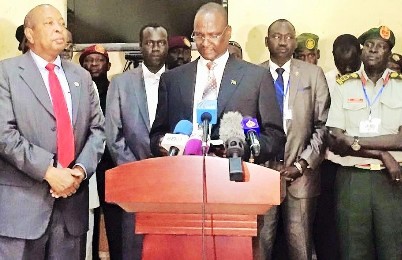S. Sudan suspends work of constitutional committee over deadlock
February 21, 2016 (JUBA) – South Sudanese peace partners have agreed to suspend the work of the national constitutional amendment committee until when the transitional government of national unity is formed without constitution, asserting it would use the peace agreement as the basis for running a new government.

The national constitutional committee is one of the institutions mandated by the August 2015 peace agreement which president Salva Kiir and the leader of armed opposition, Riek Machar, as well as other stakeholders have signed and agreed to review the 2011 transitional constitution of South Sudan. The parties would incorporate the provisions of the deal so that it becomes the legally binding supreme law of the country during the transitional period of thirty months as stipulated in the peace deal.
The committee comprising representatives of the government, armed opposition, civil society organisations, faith based groups and other political forces who are the stakeholders in the agreement have unanimously agreed to suspend its work after several disagreements.
The committee said they completed phase one of its work and activities which were about reviewing all the articles of the entire constitution to assess compatibility with the peace agreement.
They were unable to reach consensus on a number of issues including the fate of 28 states, number of presidential advisers which are not in the peace agreement as well as who should chair the first session of the transitional parliament to allow members to elect parliamentary leadership.
Other issues include how a parliamentary seat should be filled in the event it falls vacant due to any circumstances.
The members of armed opposition and other stakeholders prefer filling of parliamentary seats which had fallen vacant through election but the government preferred direct appointment by the president.
These four issues, according to the statement, would be addressed by the transitional government of national unity based on the spirit and directives spelt out in the recent communique of the council of ministers of the member countries of the Intergovernmental Authority on Development (IGAD).
“Once the four matters are resolved, the committee shall be directed by the new government to proceed to incorporate the agreed versions of the then contested provisions. That will take only half a day,” the statement extended to Sudan Tribune by the committee reads in part.
Formation of transitional government is expected to be done in mid-March due to the delays in the implementation of the security arrangements in Juba, a priority preceding phase in the peace deal.
(ST)
